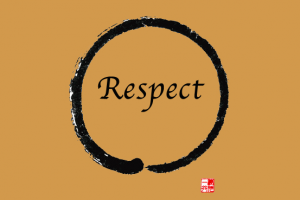 Respect is the one word we hear the most from the needs of parents. Parents want their children to show respect, to them the parents, along with demonstrating respect for grandparents, teachers, other children and objects. Teaching respect though is not as simple as sitting a child down and telling them “show respect!”
Respect is the one word we hear the most from the needs of parents. Parents want their children to show respect, to them the parents, along with demonstrating respect for grandparents, teachers, other children and objects. Teaching respect though is not as simple as sitting a child down and telling them “show respect!”
In our work at Balanced Life Skills we start using the word ‘respect’ at the very earliest times – as soon as a student comes into a class. We learn to sit showing respect, raise our hand with respect, walking into class with respect and even when we bow as we come on to the mat – saying the word respect in our mind as we bow.
This is a hard word to define, because what we see as respectful is shown in attitude and action. The attitude that is shown is that we value the person or object in front of us. Being able to value the other person for their strengths and what is good about them, brings an ‘attitude of gratitude’ and therefore an appreciation that is shown with how we conduct ourselves with them. The action – is of little value without the correct attitude. So while we may need to ‘fake it till we make it’, actions or behavior without the proper attitude to go along with it really does not feel like respect.
The same would be true with an object. We can show that we value (respect) a book by not tearing the pages, breaking the binding, putting it away carefully, reading it with joy. We value the object, what it is giving us and the privilege of having such a gift. That attitude of valuing the book allows for the actions of how we handle the book.
In our school at Balanced Life Skills we value the instructors, our classmates, the mat or dojo (where we are training), and ourselves. We demonstrate that in many ways that we will talk about this month as we discuss respect in different parts of our lives.
The way children learn the attitude and actions of respect is by watching how others – parents, teachers, adults and even other children conduct themselves and speak to other people and objects.
Every relationship, interaction, class, and day should begin and end with respect.
